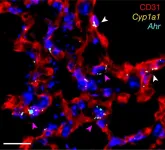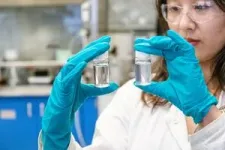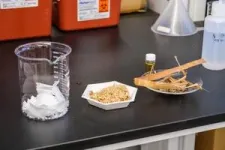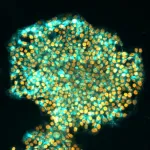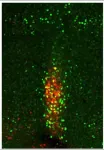Research finds that molecules in vegetables can help to ease lung infection
2023-08-16
(Press-News.org) Francis Crick Institute press release
Under strict embargo: 16:00hrs BST 16 August 2023
Peer reviewed
Experimental study
Animals
Research finds that molecules in vegetables can help to ease lung infection
Researchers at the Francis Crick Institute have found that molecules in vegetables like broccoli or cauliflower help to maintain a healthy barrier in the lung and ease infection.
The AHR – aryl hydrocarbon receptor – is a protein found at barrier sites like the gut and the lung. Natural molecules in cruciferous vegetables – for example, kale, cauliflower, broccoli, or cabbage – are dietary ‘ligands’ for AHR, which means, once eaten, they activate AHR to target a number of genes. Some of the genes targeted switch off the AHR system, allowing it to self-regulate.
The effect of AHR on immune cells is well understood, but this research, published today in Nature, now shows that AHR is also highly active in endothelial cells lining blood vessels in the lung.
The lung barrier between the body and the air outside is only made up of two layers, one of endothelial cells and one of epithelial cells, because it needs to allow oxygen to enter. But the barrier also has to be kept strong against pollution or viruses and bacteria.
The researchers conducted a series of experiments in mice to show how AHR impacts lung barriers. When mice were infected with the flu virus, blood was found in the airspaces in the lungs, as it had leaked across the damaged barrier. The researchers then showed that AHR was able to prevent the barrier from becoming leaky: when AHR was overactivated they observed less blood in the lung spaces.
They also found that mice with enhanced AHR activity didn’t lose as much weight when infected with flu, and were able to better fight off a bacterial infection on top of the original virus.
When AHR was prevented from being expressed in the lung endothelial cells of infected mice, more blood and immune cells were seen in the air spaces, showing greater damage to the barrier.
The researchers also showed that flu infection causes a decrease in protective lung AHR activity, but only in mice fed AHR ligands in their diet before the illness. These findings link food consumption to AHR activity and outcome in viral infection: infected mice didn’t eat as much food when ill, so their intake of AHR ligands was reduced and the AHR system was less active, leading to more lung damage.
Despite the infection-driven reduction of AHR activity, it was beneficial for mice to be on an AHR ligand-rich diet: these mice had better barrier integrity and less lung damage during infection than mice on the control diet. These results indicate that AHR has a protective effect on the lung barrier which is impacted by infection, but can be improved by the right diet.
Andreas Wack, Group Leader of the Immunoregulation Laboratory at the Crick, said, “Until recently, we’ve mainly looked at barrier protection through the lens of immune cells. Now we’ve shown that AHR is important for maintaining a strong barrier in the lungs through the endothelial cell layer, which is disrupted during infection.
“People may be less likely to maintain a good diet when they’re ill, so aren’t taking in the molecules from vegetables which make this system work. It’s a good idea to eat lots of cruciferous vegetables anyway, but this shows it’s even more important to continue eating them when you’re ill!”
Jack Major, former PhD student in the Wack lab and now visiting scientist at the Crick and first author, said: “What we’ve identified is a gut-lung axis – linking diet to protection against lung infection via endothelial cells.
“We looked at flu in this research, but other research has shown that COVID-19 may also reduce AHR activity in the lung. It will be interesting to investigate the impact of other respiratory viruses on AHR, and also whether different molecules in our diet use other pathways than AHR to affect lung function via endothelial cells.”
Researchers believe AHR may be important in endothelial cells in other barrier organs. A team at MRC and Imperial have reported in Nature* today that dietary factors activate AHR in the gut endothelial cells, preventing excessive cell reproduction and inflammation. Similar to the process in the lung, the authors show gut endothelial AHR is important in protection against gut infection. This provides another link between the diet and the state of the gut endothelium, an important contributor to gut health. First author Ben Wiggins has now joined the Immunoregulation Laboratory at the Crick to work with Andreas Wack.
-ENDS-
For further information, contact: press@crick.ac.uk or +44 (0)20 3796 5252
Notes to Editors
Reference: Major, J. et al. (2023). Endothelial AHR activity prevents lung barrier disruption in viral infection. Nature. 10.1038/s41586-023-06287-y
*Wiggins, B. et al. (2023). Endothelial sensing of AHR ligands regulates intestinal homeostasis. Nature. 10.1038/s41586-023-06508-4.
The Francis Crick Institute is a biomedical discovery institute dedicated to understanding the fundamental biology underlying health and disease. Its work is helping to understand why disease develops and to translate discoveries into new ways to prevent, diagnose and treat illnesses such as cancer, heart disease, stroke, infections, and neurodegenerative diseases.
An independent organisation, its founding partners are the Medical Research Council (MRC), Cancer Research UK, Wellcome, UCL (University College London), Imperial College London and King’s College London.
The Crick was formed in 2015, and in 2016 it moved into a brand new state-of-the-art building in central London which brings together 1500 scientists and support staff working collaboratively across disciplines, making it the biggest biomedical research facility under a single roof in Europe.
http://crick.ac.uk/
END
ELSE PRESS RELEASES FROM THIS DATE:
2023-08-16
In countries such as Peru, Bolivia and Chile, it’s not uncommon for people who live in foggy areas to hang up nets to catch droplets of water. The same is true of Morocco and Oman. These droplets then trickle down the mesh and are collected to provide water for drinking, cooking and washing. As much as several hundred litres of water can be harvested daily using a fog net only a few square metres in area. For regions with little rain or spring water, but where fog is a common occurrence, this can be a blessing.
One crucial drawback with this method, however, ...
2023-08-16
About The Study: Children who experienced assault had, on average, a 2 times higher risk of receiving a mental illness diagnosis and were more likely than children who had not experienced assault to present to acute care for mental illness. Early intervention to support mental health of assaulted children is warranted, particularly in the first year following assault.
Authors: Natasha Ruth Saunders, M.D., M.Sc., of the Hospital for Sick Children in Toronto, is the corresponding author.
To ...
2023-08-16
About The Study: In this study of 28,000 middle and high school students, the prevalence of vaping cannabidiol (CBD) was high, particularly among e-cigarette users and Hispanic and sexual minority populations. The findings suggest that evidence-based educational campaigns, interventions, and public policy changes are needed to reduce the harmful health outcomes possible with vaping CBD among developing youths.
Authors: Hongying Daisy Dai, Ph.D., of the University of Nebraska Medical Center in Omaha, is the corresponding author.
To access the embargoed study: Visit our For The Media website at this link https://media.jamanetwork.com/
(doi:10.1001/jamanetworkopen.2023.29167)
Editor’s ...
2023-08-16
About The Study: The incidence rates in the U.S. of early-onset cancer (younger than age 50) increased from 2010 to 2019 in this study of 562,000 patients. Although breast cancer had the highest number of incident cases, gastrointestinal cancers had the fastest-growing incidence rates among all early-onset cancers. These data may be useful for the development of surveillance strategies and funding priorities.
Authors: Daniel Q. Huang, M.B.B.S., M.M.E.D., and Cheng Han Ng, M.B.B.S., of the National University of Singapore, are the corresponding authors.
To access the embargoed study: ...
2023-08-16
In a groundbreaking study published today in Nature, Australian scientists have resolved a long-standing problem in regenerative medicine. Led by Professor Ryan Lister from the Harry Perkins Institute of Medical Research and The University of Western Australia and Professor Jose M Polo from Monash University and the University of Adelaide, the team developed a new method to reprogram human cells to better mimic embryonic stem cells, with significant implications for biomedical and therapeutic uses.
In a revolutionary advance in the mid-2000s, it was ...
2023-08-16
About The Study: Paternal depression was associated with subsequent offspring depression in this systematic review and meta-analysis including 7.1 million father-child dyads from 16 observational studies. This finding shows the intergenerational transmission of mental health problems and suggests that mental health interventions benefit not only the patient but also the family as a whole, including both parents.
Authors: Berihun Dachew, Ph.D., of Curtin University in Perth, Australia, is the corresponding author.
To ...
2023-08-16
About The Study: The findings from this case series show that pig-to-human xenotransplant provided life-sustaining kidney function in a deceased human with chronic kidney disease. Future research in living human recipients is necessary to determine long-term xenograft kidney function and whether xenografts could serve as a bridge or destination therapy for end-stage kidney disease.
Authors: Jayme E. Locke, M.D., M.P.H., of the University of Alabama at Birmingham Heersink School of Medicine, is the corresponding author.
To access the embargoed study: Visit our For The Media website at this link https://media.jamanetwork.com/
(doi:10.1001/jamasurg.2023.2774)
Editor’s ...
2023-08-16
Blood Factor Can Turn Back Time in the Aging Brain
Platelets are behind the cognitive benefits of young blood, exercise and the longevity hormone klotho
In a remarkable convergence, scientists have discovered that the same blood factor is responsible for the cognitive enhancement that results from young blood transfusion, the longevity hormone klotho, and exercise.
In a trio of papers appearing in Nature, Nature Aging and Nature Communications on August 16, 2023, two UCSF teams and a team from the University of Queensland (Australia), identify platelet ...
2023-08-16
LA JOLLA, CA—Neuroscientists at Scripps Research have identified brain circuits that make mammals want to eat more when they are exposed to cold temperatures.
Mammals automatically burn more energy to maintain normal body temperature when exposed to cold. This cold-activated increase in energy expenditure triggers an increase in appetite and feeding, although the specific mechanism controlling this had been unknown. In the new study, reported on August 16, 2023, in Nature, the researchers identified a cluster of neurons that work as a “switch” for this cold-related, food-seeking behavior in mice. The discovery could lead to potential ...
2023-08-16
Could plants be the answer to the looming threat of microplastic pollution? Scientists at UBC’s BioProducts Institute found that if you add tannins—natural plant compounds that make your mouth pucker if you bite into an unripe fruit—to a layer of wood dust, you can create a filter that traps virtually all microplastic particles present in water.
While the experiment remains a lab set-up at this stage, the team is convinced that the solution can be scaled up easily and inexpensively once they find the right industry partner.
Microplastics ...
LAST 30 PRESS RELEASES:
[Press-News.org] Research finds that molecules in vegetables can help to ease lung infection
